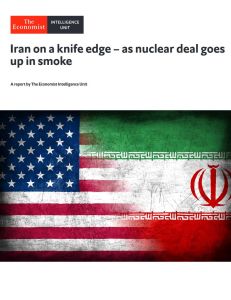Join getAbstract to access the summary!

Join getAbstract to access the summary!
EIU
Iran on a knife edge – as nuclear deal goes up in smoke
EIU, 2018
What's inside?
A US withdrawal from the Iran nuclear deal would put Middle East stability, oil prices and the Iranian economy at risk.
Recommendation
US president Donald Trump’s plan to withdraw America from the Iran nuclear deal may fulfill one of his crucial campaign promises, but the broader implications of this decision remain open. The agreement’s other signatories – France, Germany, the United Kingdom, China and Russia – staunchly oppose the move, warning that the demise of the Joint Comprehensive Plan of Action (JCPOA) would lead to increased destabilization and economic upheaval in the Middle East. getAbstract recommends this report by the Economist Intelligence Unit to shed light on the main terms of the JCPOA and explore the likely consequences of a US withdrawal.
Summary
About the Author
The Economist Intelligence Unit provides forecasting and advisory services as part of the Economist Group.
















Comment on this summary